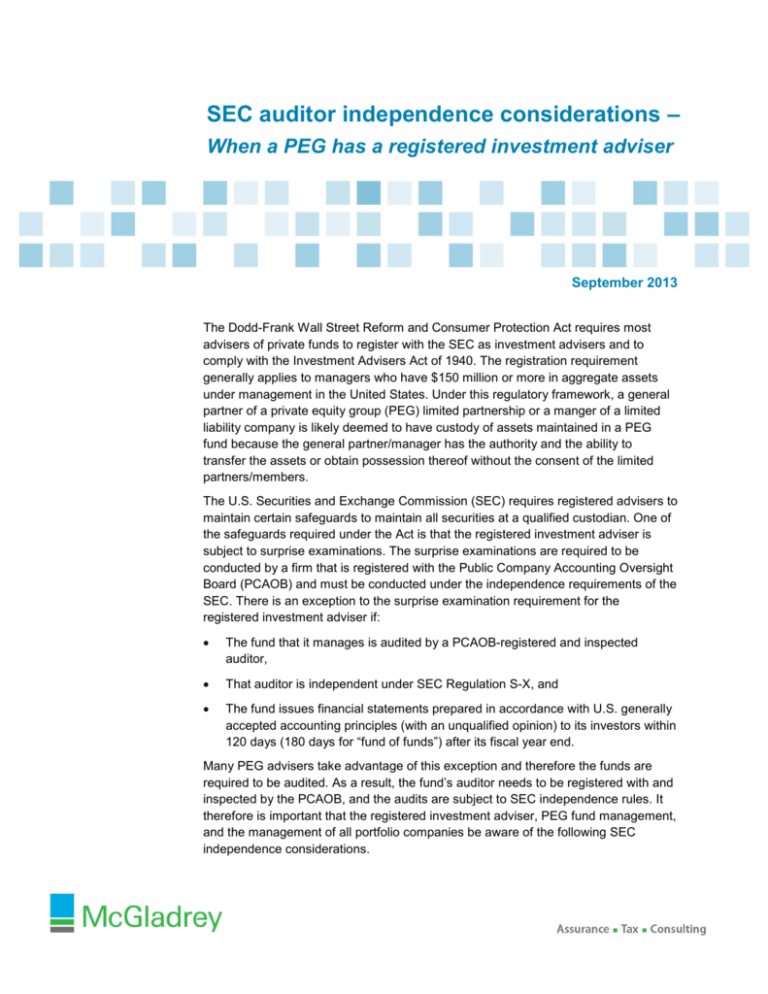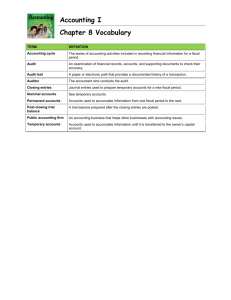
SEC auditor independence considerations –
When a PEG has a registered investment adviser
September 2013
The Dodd-Frank Wall Street Reform and Consumer Protection Act requires most
advisers of private funds to register with the SEC as investment advisers and to
comply with the Investment Advisers Act of 1940. The registration requirement
generally applies to managers who have $150 million or more in aggregate assets
under management in the United States. Under this regulatory framework, a general
partner of a private equity group (PEG) limited partnership or a manger of a limited
liability company is likely deemed to have custody of assets maintained in a PEG
fund because the general partner/manager has the authority and the ability to
transfer the assets or obtain possession thereof without the consent of the limited
partners/members.
The U.S. Securities and Exchange Commission (SEC) requires registered advisers to
maintain certain safeguards to maintain all securities at a qualified custodian. One of
the safeguards required under the Act is that the registered investment adviser is
subject to surprise examinations. The surprise examinations are required to be
conducted by a firm that is registered with the Public Company Accounting Oversight
Board (PCAOB) and must be conducted under the independence requirements of the
SEC. There is an exception to the surprise examination requirement for the
registered investment adviser if:
•
The fund that it manages is audited by a PCAOB-registered and inspected
auditor,
•
That auditor is independent under SEC Regulation S-X, and
•
The fund issues financial statements prepared in accordance with U.S. generally
accepted accounting principles (with an unqualified opinion) to its investors within
120 days (180 days for “fund of funds”) after its fiscal year end.
Many PEG advisers take advantage of this exception and therefore the funds are
required to be audited. As a result, the fund’s auditor needs to be registered with and
inspected by the PCAOB, and the audits are subject to SEC independence rules. It
therefore is important that the registered investment adviser, PEG fund management,
and the management of all portfolio companies be aware of the following SEC
independence considerations.
Defining the audit firm
The SEC defines “accounting firm” as an organization that is engaged in the practice
of public accounting and furnishes reports or other documents filed with the SEC or
otherwise prepared under the securities laws, and all of the organization's
departments, divisions, parents, subsidiaries, and associated entities, including those
located outside of the United States. McGladrey LLP is the U.S. member firm of RSM
International, a global network of independent accounting, tax and consulting firms.
Under the SEC’s rules, RSM International and its member firms are considered to be
“associated entities” of our firm. Therefore, when assessing independence, we are
required to evaluate the client relationships of McGladrey and the other RSM
International member firms as if we are one entity.
Defining the audit client
When the audited PEG fund is a registrant or has a registered investment adviser,
the SEC auditor independence rules apply both to the audit client and its affiliates.
The SEC defines “audit client” as the entity whose financial statements are being
audited, reviewed, or attested and any affiliates of the audit client. “Affiliates of the
audit client” as defined by the SEC, include:
•
An entity that has control over the audit client, or over which the audit client has
control, or which is under common control with the audit client, including the audit
client's parents and subsidiaries;
•
An entity over which the audit client has significant influence, unless the entity is
not material to the audit client;
•
An entity that has significant influence over the audit client, unless the audit client
is not material to the entity; and
•
Each entity in the investment company complex when the audit client is an entity
that is part of an investment company complex.
When applying this definition, the following should be noted:
•
Control is presumed if there is more than 50% ownership interest. Control also
may exist when there is less than 50% ownership interest if there other
conditions through which control could be exercised, e.g., board rights, veto
rights, a contract, etc.
•
Significant influence is presumed if there is more than 20% ownership interest
but less than 50% ownership interest or if board rights or similar features are
greater than 20% but less than 50%.
•
An investment is deemed material if the investment in the investee is 5% or more
of the private equity group’s total assets or fund that is subject to SEC rules. If an
investment is not yet material, consideration should be given to the likelihood that
an affiliate may become material because of changes in the value of the
investee.
2
With limited exceptions, when assessing independence, the auditor must look at any
services for or relationships with the client and the affiliates of the audit client as if
they were one entity. This impacts not only the services auditors are allowed to
provide to the fund client but also the services they are allowed to provide to all
portfolio companies controlled by the fund and all other private equity funds under
common control and portfolio companies under their control. As illustrated below, the
SEC rules will be applied to the auditor’s relationships with all entities determined to
be affiliates. The extent to which the non-audit service rules apply depends upon the
relationship between the audit client and its affiliate.
Represents affiliates of the SEC audit client
Fund A (b)
Private
Equity Fund
(a)
Fund B (b)
Fund C (SEC
audit client)
Company A1
60% (b)
Company A2
15%
Company A3
55% (b)
Company B1
10%
Company B2
25%
Company B3
65% (b)
Company C1
50% (c)
Company C2
75% (c)
Company C3
80% (c)
(a) This entity has control over the audit client.
(b) This entity is under common control with the audit client.
(c) This entity is one over which the audit client has control.
3
Prohibited services
The SEC requires auditors to be independent of their audit clients both in fact and in
appearance. In considering an auditor’s independence, the SEC looks to four
overarching principles - whether a relationship or the provision of a service:
•
Creates a mutual or conflicting interest between the accountant and the audit
client;
•
Places the accountant in the position of auditing his/her own work;
•
Results in the accountant acting as management or an employee of the audit
client; or
•
Places the accountant in a position of being an advocate for the audit client.
Accordingly, the SEC sets forth restrictions on an auditor providing certain non-audit
services to an audit client and its affiliates. Rule 2-01 of SEC Regulation S-X
specifically prohibits the following services from being performed by the auditor for
the audit client and its affiliates:
•
Bookkeeping or other services related to the audit client’s accounting records or
financial statements, e.g., preparing financial statements or tax provisions and
providing valuation or tax provision templates
•
Financial information systems design and implementation
•
Appraisal or valuation services, fairness opinions, or contribution-in-kind reports
•
Actuarial services
•
Internal audit outsourcing services
•
Management or human resources functions, e.g. executive searches
•
Broker-dealer, investment adviser or investment banking services
•
Legal and expert services unrelated to the audit, e.g., litigation support
It is typical that individual portfolio companies use public accounting firms to provide
non-audit services to assist them in addressing a wide variety of issues. For example,
auditors commonly are asked to provide non-audit services, such as preparing
financial statements or tax provisions, providing valuation or tax provision templates,
and assisting with financial information systems implementation. As discussed above,
providing non-audit services to an audit client or its affiliate can pose a problem for
auditor independence.
“Not subject to audit” exception
Language in certain SEC rules states independence is impaired unless “. . . it is
reasonable to conclude that the results of the services will not be subject to the audit
procedures of the auditor during its audit of the audit client’s financial statements.”
4
The “not subject to audit” exception is not available to any entities that are
downstream affiliates of an audit client subject to SEC independence rules,
regardless of whether the fund’s auditor audits the downstream affiliates. If a fund
audit is subject to SEC independence rules, the auditor cannot provide any prohibited
services to the portfolio companies that roll up into that fund’s financial statements.
This rule applies whether the portfolio companies are reported at fair value or are
consolidated. It should be noted, however, that this “not subject to audit” exception
can be applied to brother/sister entities of a portfolio company that is considering an
initial public offering.
Rules that include the “not subject to audit” exception are those governing the
following prohibited services:
•
Bookkeeping or other services related to the audit client’s accounting records or
financial statements, e.g., preparing financial statements or tax provisions and
providing valuation or tax provision templates
•
Financial information systems design and implementation
•
Appraisal or valuation services, fairness opinions, or contribution-in-kind reports
•
Actuarial services
•
Internal audit outsourcing services
The “not subject to audit” exception cannot be applied to the following prohibited
services:
•
Internal audit outsourcing services
•
Management or human resources functions, e.g. executive searches
•
Loaned staffing arrangements
•
Litigation support
Conclusion
Maintaining auditor independence in a private equity environment can be particularly
challenging given the significant number of entities under common control. It
therefore is important that there be effective two-way communication between the
auditor and PEG fund management regarding matters such as non-audit services. It
is equally important that there be effective two-way communication between PEG
fund management and its portfolio companies regarding these matters. Please
contact your McGladrey audit engagement partner for answers to questions
regarding the application of SEC auditor independence rules to your specific
situation.
5
800.274.3978
www.mcgladrey.com
This document contains general information, may be based on authorities that are subject to change, and is not a
substitute for professional advice or services. This document does not constitute assurance, tax, consulting,
business, financial, investment, legal or other professional advice, and you should consult a qualified professional
advisor before taking any action based on the information herein. McGladrey LLP, its affiliates and related
entities are not responsible for any loss resulting from or relating to reliance on this document by any person.
McGladrey LLP is an Iowa limited liability partnership and the U.S. member firm of RSM International, a global
network of independent accounting, tax and consulting firms. The member firms of RSM International collaborate
to provide services to global clients, but are separate and distinct legal entities that cannot obligate each other.
Each member firm is responsible only for its own acts and omissions, and not those of any other party.
McGladrey, the McGladrey logo, the McGladrey Classic logo, The power of being understood, Power comes from
being understood and Experience the power of being understood are registered trademarks of McGladrey LLP.
© 2013 McGladrey LLP. All Rights Reserved.
6







